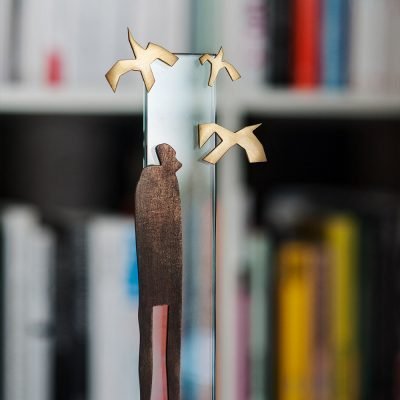Eight poets and their translators have been nominated for this year’s European Poet of Freedom Award. Apart from meet the author events, the festival’s programme is packed with debates and confrontations, 15-minute sets with Polish literary critics, a poetry slam, an evening of poetry readings and the official award ceremony directed by Wiktor Rubin. Celebrate poetry and the beginning of spring in Gdańsk with the City Culture Institute!
The European Poet of Freedom is a unique festival, which introduces the Polish audience to the most important contemporary poets. The nominated volumes of verse have been translated into Polish for the very first time. The authors invited to Gdańsk have caused a sensation on their local literary scenes, and thanks to outstanding literary translators, their works will be available to Polish readers in March.
The nominees of the festival’s 5th edition are: Səlim Babullaoğlu (Azerbaijan) Polkovnike heç kim yazmır [No one writes to the colonel], transl. into Polish by İlahə Kərimova and Grażyna Zając, Tatev Chakhian (Armenia) ԱնանձնաԳՐԱյին [(Non-)Identity card], transl. by Haik Howannisjan and Paweł Sakowski, Dumitru Crudu (Moldova) Falsul Dimitrie [The false Dimitri], transl. into Polish by Jakub Kornhauser and Joanna Kornaś-Warwas, Plamen Doynov (Bulgaria) София Берлин [Sofia Berlin], transl. into Polish by Dymitr and Dorota Dobrew, Hanna Karpińska, Wojciech Gałązka, Erkka Filander (Finland) Heräämisen valkea myrsky [The white storm of awakening], transl. into Polish by Katarzyna Szal, Alice Oswald (UK) Falling Awake, transl. into Polish by Magda Heydel, Linda Vilhjálmsdóttir (Iceland) Frelsi [Freedom], transl. into Polish by Jacek Godek, Menno Wigman (The Netherlands) Mijn naam is Legioen [My name is Legion], transl. into Polish by Barbara Kalla and Adam Wiedemann.
The nominees were selected by a jury composed of Krzysztof Czyżewski – Chair, Paweł Huelle, Zbigniew Mikołejko, Stanisław Rosiek, Anda Rottenberg, Beata Stasińska and Olga Tokarczuk. Andrzej Jagodziński, the jury’s secretary, did not participate in the vote. The winner of the European Poet of Freedom award will receive PLN 100,000, and their translator(s) -– PLN 10,000. The official award ceremony, directed by Wiktor Rubin, will take place on 25 March in the Gdańsk Shakespeare Theatre.
Tadeusz Dąbrowski, the festival’s artistic director, on the nominees:
The poetry of Alice Oswald takes place in the In-Between: at dusk, at dawn and in the clearance, on the border between life and death. There is a flurry of activity there: flies excitedly talk about dirt, a flower closes its eyelids with a hiss, and a badger shuffles over the heads of the dead. For more information on the author, whose forthcoming poetry volume was translated into Polish by Magda Heydel, go to: http://europejskipoetawolnosci.pl/book/alice-oswald-wielka-brytania/.
Dumitru Crudu’s poetic project is a modern idyll, or rather a dream about it, starring her: a muse, a lover, at times a sex toy. This poetry is seemingly uneventful: the protagonist observes cockroaches and butterflies, minds pigs and… writes poems about it. However, this uneventfulness resonates with loneliness and the need to feel intimacy with another human being. For more information on the author, whose forthcoming poetry volume was translated into Polish by Joanna Kornaś-Warsaw, go to: http://europejskipoetawolnosci.pl/book/dumitru-crudu-moldawia/.
Vilhjálmsdóttir’s poetry volume titled Freedom in fact talks about enslavement. The author employs irony to condemn petty bourgeois rituals and the sense of welfare instilled into us by capitalism, popular culture and our own spiritual idleness. The life of her protagonists takes place between the living-room sofa and the garden grill, a trivial job and even more trivial pleasures. For more information on the author, whose forthcoming poetry volume was translated into Polish by Jacek Godek, go to: http://europejskipoetawolnosci.pl/book/linda-vilhjalmsdottir-islandia/.
Menno Wigman’s language oozes with the street and the library. His poems, often quite mundane and crude, filled to the brim with the observation of everyday events, are at the same time a nonchalant conversation with books that left a mark on the poet. For more information on the author, whose forthcoming poetry volume was translated into Polish by Barbara Kalla and Adam Wiedemann, go to: http://europejskipoetawolnosci.pl/book/menno-wigman-holandia/.
Whoever reads these poems, stands “wide open”, with their “senses like a coat flapping in the wind” – just like the author. There is no inside and outside here. Nature literally impregnates both Filander and ourselves. A tour de force of metaphor, the most unpredictable of the elements. For more information on the author, whose forthcoming poetry volume was translated into Polish by Katarzyna Szal, go to: http://europejskipoetawolnosci.pl/book/erkka-filander-finlandia/.
Doynov’s poetry is also lyrical, at times sentimental, rarely metaphysical. As if his sarcasm launched him onto the path towards unmediated experience, towards a truth as simple as a reflection of sky in a well. For more information on the author, whose forthcoming poetry volume was translated into Polish by Dymitr Dobrew, Dorota Dobrew, Hanna Karpińska and Wojciech Gałązka, go to: http://europejskipoetawolnosci.pl/book/plamen-dojnow-bulgaria/.
Babullaoğlu often addresses specific people, generating an aura of an intimate, friendly chat on which we seem to be eavesdropping. These poems are very close to life in the literal sense: childhood meets maturity and old age here, and together, they sing a song of praise for the world. For more information on the author, whose forthcoming poetry volume was translated into Polish by İlahə Kərimov and Grażyna Zając, go to: http://europejskipoetawolnosci.pl/book/selim-babullaoglu-azerbejdzan/.
The poetry of Tatev Chakhian is like wind blowing through an old forest. She touches upon problems that are deeply rooted in collective and individual history with incredible lightness, looking beneath the surface of everyday events and revealing their mysterious, non-obvious nature. For more information on the author, whose forthcoming poetry volume was translated into Polish by Haik Howannisjan and Paweł Sakowski, go to: http://europejskipoetawolnosci.pl/book/tatev-chakhian-armenia/.
Organiser: City Culture Institute, City of Gdańsk
www.europejskipoetawolnosci.pl
www.facebook.com/europejskipoetawolnosci
City Culture Institute is also a publishing house. Every poetic book nominated to European Poet of Freedom Award is published in the author’s language and translated to Polish. Amongst others City Culture Institute has published books about Gdańsk history and architecture, translators and their work, novels by Gdańsk’s authors and cultural research reports.











